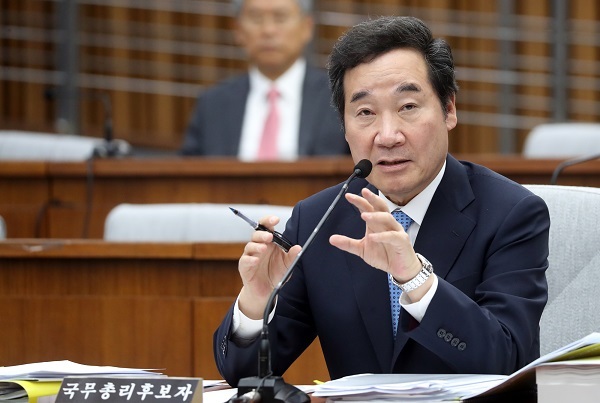Prime minister nominee Lee Nak-yon’s two-day confirmation hearing began Wednesday, with opposition parties honing in on his national security stance, and alleged wrongdoings in his private affairs.
At the hearing, Lee referred to North Korea as a “primary enemy” but avoided the term “main enemy,” and stressed the importance of the South Korea-US alliance.
“Militarily (North Korea) is a primary enemy, but the prime minister cannot only consider military (issues),” Lee said, saying that the term main enemy is not used in Seoul’s defense whitepaper.
 |
Prime minister nominee Lee Nak-yon (Yonhap) |
Mirroring President Moon Jae-in’s presidential candidates’ debate, Lee was asked whether he considered North Korea as the “main enemy.” The term was previously used to refer to North Korea, but was removed from defense whitepapers during the Kim Dae-jung and Roh Moo-hyun administrations. During the two conservative administrations that followed, the expression “The North Korean regime, and the North Korean military is the enemy” was used.
“There is no doubt that the South Korea-US alliance is the most central pillar of South Korea,” Lee said in response to questioning about his stance on self-reliant, and allied national defense.
Lee also said that the views expressed by Moon chung-in, presidential unification and foreign affairs secretary, were his personal opinion and reiterated the government’s position on maintaining sanctions. In a recent interview, the newly appointed presidential adviser said that inter-Korean dialogue should be resumed regardless of nuclear issues.
“The government’s fundamental position is that the international community’s North Korea sanctions must be respected and must not be violated,” Lee said.
“The view (of the government) is that dialogue cannot occur without changes on part of North Korea.”
Lee also said that he now holds different views regarding the sinking of the South Korean warship Cheonan, and North Korean human rights bill than he did while serving as a lawmaker.
“(Now) I think that North Korea was behind (the sinking of the ship). I trust the government’s announcement at the time,” Lee said. At the time, some in the progressive bloc had opposed the government report on the incident, which said that the ship was sunk by North Korea.
Regarding the North Korean human rights bill, Lee said that he believed conditions in North Korea must improve and that he was following his party’s decision in opposing the bill. Before being elected the governor of South Jeolla Province, Lee served four terms in the National Assembly with the ruling Democratic Party of Korea.
With the opposition Liberty Korea Party taking the lead, opposition lawmakers also honed in on alleged wrongdoings carried out by Lee and his family. Allegations include Lee’s son evading taxes and draft dodging, and his wife using a false address to gain employment in a school in southern Seoul.
Lee also faced criticism over his decision to withhold some information requested by lawmakers on the confirmation committee citing privacy issues.
Saying that Lee was refusing to “provide the most basic information,” Liberty Korea Party Floor Leader Rep. Chung Woo-taik claimed that the prime ministerial candidate was acting in contempt of the National Assembly. The People’s Party also criticized Lee over the lack of information provided, and promised a tough hearing.
In contrast, former People’s Party leader Rep. Park Jie-won on Wednesday said that Lee’s appointment would be approved without trouble.
Speaking in a radio interview, Park claimed that he has a very close relationship with Lee, and that he knows Lee to have no faults significant enough to keep him from taking office.
By Choi He-suk (
cheesuk@heraldcorp.com)







![[From the Scene] At this Starbucks, you need ID: Franchise opens store with view of North Korea](http://res.heraldm.com/phpwas/restmb_idxmake.php?idx=644&simg=/content/image/2024/11/29/20241129050068_0.jpg)
